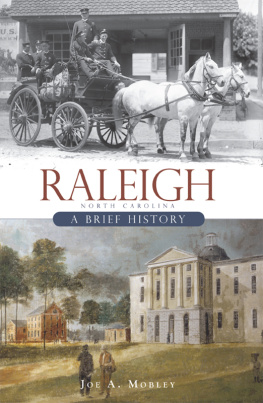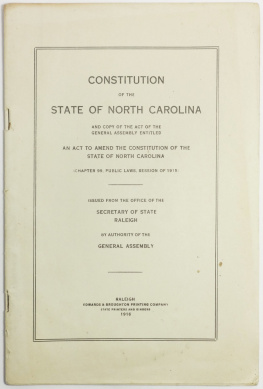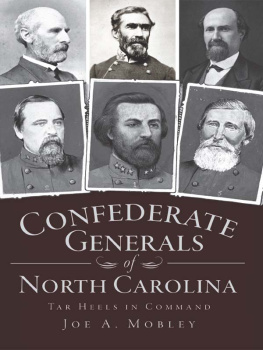1990 The University of North Carolina Press
All rights reserved
Library of Congress Cataloging-in-Publication Data
Pleasants, Julian M.
Frank Porter Graham and the 1950 Senate race in North Carolina /
by Julian M. Pleasants and Augustus M. Burns III.
p. cm.(The Fred W. Morrison series in Southern studies)
Includes bibliographical references.
ISBN 0-8078-6583-4 (alk. paper)
1. North CarolinaPolitics and government18651950.
2. ElectionsNorth CarolinaHistory20th century. 3. Graham,
Frank Porter, 1886. 4. United States. Congress. Senate
Elections, 1940. 5. North CarolinaRace relations. I. Burns,
Augustus Merrimon, 1939. II. Title. III. Series.
F259.P64 1990 90-50011
324.9756043dc20 CIP
The paper in this book meets the guidelines for permanence and durability of the Committee on Production Guidelines for Book Longevity of the Council on Library Resources.
Design by April Leidig-Higgins
Manufactured in the United States of America
94 93 92 91 90 5 4 3 2 1
Preface
The Senate primaries between Frank Porter Graham and Willis Smitha political fight that stirred the state of North Carolina in 1950first came to our scholarly attention when we were graduate students at the University of North Carolina at Chapel Hill. We were each pursuing research topics tangentially related to the Smith-Graham race, and independently we noted the interest and appeal of this contest as a possible research project. Our scholarly interest in the campaign was no doubt spurred by our own boyhood memories of it, shadowed though they were by the far more critical exploits of Charlie Justice and his teammates on the gridirons of Kenan Stadium and fields beyond.
When we began our study in earnest in the mid-1980s, we were confident that we could complete the project in three years. Early on we were disabused of that folly. As we researched, we found a corpus of primary materials far more extensive than we had envisioned. Many of the manuscripts we located had never been examined by researchers, some becoming accessible only as we were working. Others, including the mountain of materials in the Frank Porter Graham collection in the Southern Historical Collection at the University of North Carolina at Chapel Hill, had never been combed for Grahams 1950 Senate campaign. To mention three of the many collections we examined, we were the first scholars to utilize the papers of Allard K. Lowenstein, Daniel A. Powell, and Charles W. and Gladys A. Tillett, also in the Southern Historical Collection, as they related to the 1950 Senate race. We located other manuscripts, as our bibliography indicates, and were able to compose the bulk of our study from these primary sources.
We also found our conversations with campaign participants and their associates to be of immeasurable value. Especially useful were our interviews with Smith partisans, a number of whom were both cooperative and forthright in their discussions with us. To observe firsthand the hold that this race continues to exert on its surviving participantsSmith and Graham supporters alikeis to be reminded of the depth of emotions and beliefs that this contest aroused.
The interviews with Smith supporters were critical to our research because, despite our persistent efforts, we could not persuade members of the Smith family to lift the seal on their fathers papers, which are housed at Duke University. On three separate occasions we sought access to the papers of Willis Smith. First, we wrote a formal letter of request to the late Dr. Mattie Russell, then director of manuscript collections at Duke. Dr. Russell added her strong support to our request when she submitted it to the Smith family, but to no avail. We next contacted Willis Smiths son Lee, who again denied us access to the papers. After a time, we appealed to the Smith family through James K. Dorsett, Jr., Smiths former law partner and the husband of Smiths daughter Anna Lee. Mr. Dorsett explained our need to examine the papers but conveyed our intention to proceed with our study even without them. The family turned us down yet again, and at this point, we yielded. Upon completion of the manuscript, however, we offered family members, through Mr. Dorsett, an opportunity to review our work for factual accuracy, which they declined. In the summer of 1990, we were finally allowed to read the papers, but the materials on the 1950 campaign proved to be insubstantial.
The refusal of the Smith family to cooperate with us was our major research disappointment, although some campaign participants would not discuss the race with us. Neither Smith workers John Anderson and Tom Ellis nor Lee Smith would talk to us. On the Graham side, only former Graham Senate aide John D. McConnell refused our request for an interview. Other participants we approached were cooperative, including many Smith partisans. James K. Dorsett, Jr., J. C. B. Ehringhaus, Jr., Jesse A. Helms, William T. Joyner, Jr., Richard Thigpen, and others shared their reminiscences with us to our great benefit.
Graham supporters whose remembrances were especially helpful included R. Mayne Albright, J. Melville Broughton, Jr., Kathryn N. Folger, William C. Friday, Kate Humphries, David M. McConnell, Terry Sanford, and the indomitable Roy Wilder, Jr. Our bibliography includes the names of many others whose assistance we value, but who are too numerous to mention here. The opportunity to meet and talk with these North Carolinians was itself a rewarding personal and historical experience.
We also found rich newspaper coverage of the campaign. North Carolina dailies and weeklies alike followed the primaries unrelentingly, as did national papers and syndicated columnists, many of whom came to North Carolina to observe the race firsthand. At times it seemed as if North Carolina papers were covering little else. These newspapers were important not only because they followed the race day-to-day, but also because a number of journalists and editors were fierce partisans and participants. D. Hiden Ramsey of the Asheville Citizen, Jonathan Worth Daniels of the Raleigh News and Observer, Louis Graves of the Chapel Hill Weekly, and H. Galt Braxton of the Kinston Daily Free Press were four editors who were ardent Graham backers and confidants. Indeed, Jonathan Danielss support of both Graham and Governor William Kerr Scott, while he was a member of the Democratic National Committee, made Daniels himself a campaign issue, as did the partisan coverage by his familys newspaper. In the Smith inner circle were Robert L. Thompson of the High Point Enterprise, John Park of the Raleigh Times, and Lynn Nisbet, a Raleigh political columnist syndicated in many of the states afternoon dailies.
In their editorials and commentary, these newspapers often offered insights into campaign strategy that no other source revealed, a point of special significance for information about the Smith campaign. For despite the abundance of manuscript sources relating to other aspects of this race, a paucity of Smith materials confronts the researcher. In addition, newspapers were the forums in which the rival campaigns lodged their major charges and responses in political advertisements. Half-page ads were ordinary in this race, and full-page statements in papers throughout the state were not unusual. Newspaper advertising in this contest was far more important than radio spots (some recordings of which survive), handbills, or any other type of formal political exchange. (Candidate debates were not a part of this race.) The heavy reliance on advertising further heightened the pivotal role of newspapers in this Senate primary.





